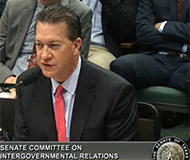8/18/2016
Texas: Camera Company Lawyer Embraces Ballot Referendum ReformRed light camera company lawyer calls for reform of the ballot initiative process in Texas.

Texas activists have been blocked several times from using the ballot initiative process to force a public vote on red light cameras. Now the man most responsible for denying citizens a say insists that he is an ally in the fight to reform the the referendum process in the Lone Star State. Andy Taylor, the lawyer of choice for American Traffic Solutions (ATS) in Texas, testified Monday before the Texas state Senate Intergovernmental Relations committee regarding the need to update the law to remove barriers to ballot initiatives that he skillfully exploited for the benefit of his client, ATS, and municipalities that use cameras.
"I've seen a lot in terms of how the playing field is not level between the government on the one hand and the citizen on the other," Taylor testified. "That's because, in my opinion, of a failure -- a gap -- in the law."
Taylor has taken on clients who run ballot initiatives on other hot political topics, but his ties to the photo enforcement industry remain deep. He recently formed the TaylorHittner law firm with George Hittner, former general counsel for ATS.
Taylor used the imbalance in the referendum law on behalf of several municipalities desperate to preserve their photo ticketing programs. Taylor created fake organizations and used random individuals to disguise the role ATS played in the legal attack against residents and their right to vote. As part of his take-no-prisoners approach, Taylor argued in court documents that anyone who opposes red light cameras must be a racist. ATS also engaged in personal attacks and lawsuits against citizens who filed anti-camera petitions in an attempt to dissuade them from participating in the political process. Taylor technically succeed in the legal fight in Houston, though the cameras were taken down after the mayor allowed the vote to take place.
In the Houston suburbs, anti-camera activist H. F. Van Der Grinten testified before the committee about how his group collected 3000 valid signatures that should have triggered a vote on red light cameras in Sugar Land. When he sought advice from lawyers on what he could do to overcome Taylor's legal maneuvers, he was told the court fight would be extremely expensive.
"We lacked the financial resources to do so," Van Der Grinten said. "So automated red light camera enforcement continues in Sugar Land."
Last month, the Texas Court of Appeals reversed a lower court that had blocked a red light camera ban from appearing on the ballot in the city of Cleveland (view ruling).


